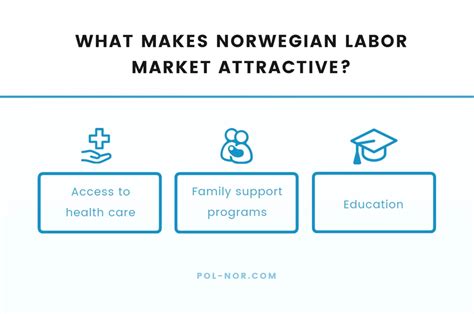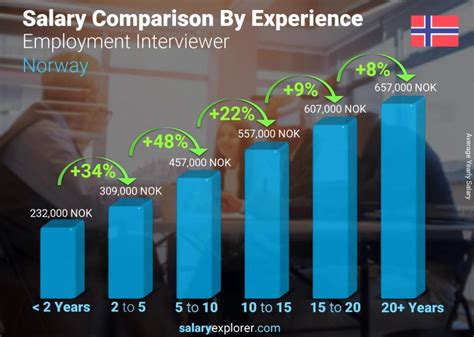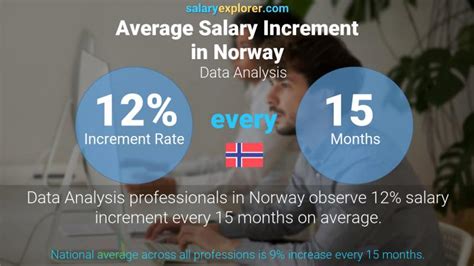Considering a career move to Norway? You're likely drawn to its stunning natural beauty, high quality of life, and robust economy. But what can you actually expect to earn? Navigating salary expectations in a new country can be complex. Norway is known for its high earning potential, with average salaries ranking among the highest in the world, but this comes with a high cost of living and a unique economic structure.
This data-driven guide will break down the average salary in Norway, explore the key factors that determine your earning potential, and provide a clear picture of what to expect from the Norwegian job market.
Understanding the Norwegian Labor Market

Before diving into the numbers, it's crucial to understand the context of work in Norway. Unlike many countries, Norway's labor market is heavily influenced by collective agreements. These are wage and working condition agreements negotiated between trade unions and employer associations. This system leads to a more compressed wage structure than in countries like the US, meaning the gap between the highest and lowest earners is smaller.
Furthermore, while salaries are high, so are taxes and the cost of living, particularly in major cities. However, these taxes fund a world-class social safety net, including universal healthcare, subsidized education, and generous parental leave, which are all part of the overall compensation and quality of life package.
Average Salary in Norway: The Big Picture

When analyzing national salary data, it's best to consult official government sources. The most authoritative source for this information is Statistics Norway (SSB), the country's national statistical institute.
According to the latest data from Statistics Norway, the average monthly salary for all employees was 54,340 Norwegian Krone (NOK) as of the end of 2023.
- Average Annual Salary: Approximately 652,080 NOK
- Approximate USD: ~$60,800 USD (at an exchange rate of 10.7 NOK to 1 USD)
- Approximate EUR: ~€56,700 EUR (at an exchange rate of 11.5 NOK to 1 EUR)
*(Note: Exchange rates are subject to constant fluctuation. These conversions are for illustrative purposes.)*
It's also helpful to look at the median salary, which is the "middle" value that can often be more representative than the average (mean) as it is less skewed by extremely high earners. SSB reports the median monthly salary was 50,150 NOK, or roughly 601,800 NOK per year.
Salary aggregators, which rely on user-submitted data, often report slightly different figures but paint a similar picture. For instance, sites like Glassdoor and Payscale might show varying averages based on the data set of their users, but they consistently place Norwegian salaries in a high global bracket.
Key Factors That Influence Salary in Norway

Your personal salary will depend on a combination of critical factors. Here’s a breakdown of what influences your earning potential in Norway.
### Level of Education
Education plays a significant role in determining salary levels in Norway. As in most developed economies, a higher level of formal education generally translates to higher pay.
- Upper Secondary Education: Workers with this level of education form the baseline for many salary statistics.
- Tertiary Education (Bachelor's Degree): Possessing an undergraduate degree typically results in an income significantly above the national average.
- Post-Graduate Education (Master's/PhD): Individuals with a Master's degree or a PhD command the highest salaries, particularly in specialized technical, scientific, and financial fields. The premium for a PhD is especially high in research and development roles in both the public and private sectors.
### Years of Experience
Experience is a universal driver of salary growth, and Norway is no exception. The wage structure is designed to reward loyalty and expertise built over time.
- Entry-Level (0-2 years): New entrants to the job market will typically earn below the national average as they gain foundational skills.
- Mid-Career (3-10 years): With several years of experience, professionals can expect to see their salaries rise to, and then exceed, the national average.
- Senior/Executive Level (10+ years): Highly experienced professionals and managers with over a decade of experience are the highest earners, often making significantly more than the average figures cited above.
### Geographic Location
Where you work in Norway has a direct impact on your salary, largely due to the varying cost of living across the country.
- Oslo: As the capital and economic hub, Oslo consistently has the highest average salaries. However, it also has the highest cost of living, including housing and transportation.
- Stavanger: Known as the "oil capital," Stavanger boasts high salaries, especially in the energy sector.
- Bergen and Trondheim: These major cities also offer competitive salaries that are generally above the national average but often have a slightly lower cost of living than Oslo.
- Rural Areas: Salaries in smaller towns and rural regions are typically lower to reflect the lower cost of living.
### Company Type and Industry
The industry you work in is one of the most powerful determinants of your salary. Norway's economy has clear high-paying sectors.
- High-Paying Industries:
- Oil and Gas (Mining and Quarrying): Historically and currently the highest-paying sector in Norway.
- Financial and Insurance Services: Banking, investment, and insurance roles command very high salaries.
- Information & Communication Technology (ICT): Software developers, data scientists, and cybersecurity experts are in high demand and well-compensated.
- Scientific and Technical Professions: Engineers, geologists, and senior researchers earn very competitive wages.
- Lower-Paying Industries: Sectors like accommodation, food service, and retail generally offer salaries on the lower end of the national scale.
- Public vs. Private Sector: Generally, the private sector offers higher top-end salaries, especially in industries like finance and technology. However, the public sector provides excellent job security, strong benefits, and competitive wages, particularly for roles requiring high levels of education (e.g., doctors, university professors).
Job Outlook

The job outlook in Norway remains strong and stable. The country consistently features one of the lowest unemployment rates in Europe. According to the OECD Economic Forecast for Norway (2023), the labor market is expected to remain tight, with continued demand for skilled labor.
Key growth areas include:
1. Technology: A booming tech scene in Oslo and other cities creates high demand for IT professionals.
2. Green Energy and Sustainability: As a global leader in the energy transition, Norway has a growing need for experts in renewable energy, electrification, and sustainable technology.
3. Healthcare: Like many developed nations, Norway has a continuous need for doctors, nurses, and other healthcare professionals to support its public health system.
While the U.S. Bureau of Labor Statistics (BLS) does not cover Norway, national sources like NAV (the Norwegian Labour and Welfare Administration) consistently report a high demand for skilled and educated workers, making the country an attractive destination for qualified international professionals.
Conclusion

Working in Norway offers a unique opportunity for high earning potential combined with an exceptional quality of life. While the headline average salary of around 652,080 NOK per year is attractive, your individual earnings will be shaped by a predictable set of factors.
Key Takeaways:
- Aim High: The average Norwegian salary is among the highest in the world, but be mindful of the high cost of living and taxes.
- Specialize and Educate: A post-graduate degree in a high-demand field like technology, finance, or energy is the surest path to a top-tier salary.
- Experience Pays: Salary growth is closely tied to your years of experience and proven expertise.
- Location Matters: Major economic hubs like Oslo and Stavanger offer the highest wages but also come with the highest living expenses.
For anyone considering building a career in Norway, the outlook is bright. With a stable economy, a need for skilled professionals, and a commitment to work-life balance, it represents a premier destination for global talent.
